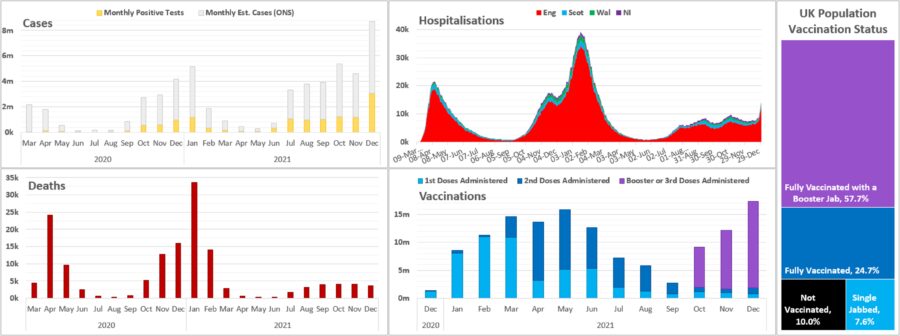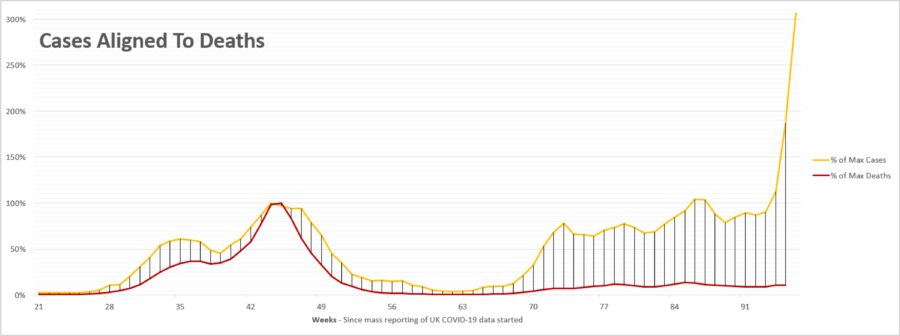England’s approach to COVID restrictions this January is very different to last January. It’s also worlds away from how European neighbours are reacting.
Many countries are now imposing tighter travel restrictions, and implementing lockdowns, while England (and to some degree the UK) is moving in the opposite direction.
For example, the “red list” of countries has been scrapped, as has the need to get a pre-departure test when travelling. Isolation periods have also been reduced and were masks not mandatory in indoor public spaces, you could be mistaken for thinking the pandemic was over.
England’s libertarian approach comes as the country’s infection rates hit an all time high. One in 15 people in the UK had COVID in the last week of December. Not since the pandemic started, or in the last year, in the last week! 🤯
So why is the UK making these decisions?
Do the statistics offer any justification for these changes?
Last year I posted several articles looking at the UK’s COVID-19 data and exploring the effectiveness of vaccination. Things have changed a lot since, so here’s an update.
UK COVID-19 Stats
The UK is now 90% vaccinated. Nine in 10 people aged 12 and over have had at least one dose of a COVID-19 vaccine. Around 80% are “fully vaccinated” having had two doses, and around 60% have also had a booster (or third) jab. 💉
While hospitalisations started to rise quite rapidly at the end of the December, they’re also still nowhere near to the 40k numbers we saw last January.
Why is this?
There are many reasons, but the two biggest seem to be: Vaccinations and Omicron.
Vaccinations
Vaccination has undoubtedly helped to weaken the link between infections and deaths. Despite there being around 3 million more infections in December 2021 than January 2021, there were around 30k fewer COVID related deaths.
This chart shows that link between cases and deaths.
You can see last year in weeks 44 and 45 (January 2021) cases and deaths hit their peak – I’ve used this as the baseline maximum, 100%. Until week ~60 (May 2021) cases and deaths were fairly well aligned, cases went up, deaths went up. However that link has been slowly weakening. Since May 2021, cases have risen and fallen, with deaths hardly moving, and that’s in no small part thanks to vaccinations. By May 2021, around 1 in 3 people were fully vaccinated and 2 in 3 had had at least one dose.
In week 95 (the last full week I have data for) deaths were around 11% of January 2021 levels, while cases were almost 190%. The virus no longer has the same ability to kill as it once did.
N.B. Cases shown aren’t positive tests, but the ONS infection study estimates. Deaths are those within 28 days of a positive test, by date of death. Deaths have been moved forward by one week, to better align them to cases.
Omicron
The other contributing factor is Omicron. In the last month, UK COVID cases have been rising exceedingly fast. This is in part due to the more infectious Omicron strain of the virus.
 At the start of December 2021, around 1% of UK cases were the Omicron variant, with Delta making up the vast majority of all cases. Last week, 96% of all cases were Omicron. That’s insane growth! Omicron took over as the dominant strain in around 2 weeks, almost wiping Delta infections out in the space of a month.
At the start of December 2021, around 1% of UK cases were the Omicron variant, with Delta making up the vast majority of all cases. Last week, 96% of all cases were Omicron. That’s insane growth! Omicron took over as the dominant strain in around 2 weeks, almost wiping Delta infections out in the space of a month.
You can explore this more with this fantastic tool by Our World In Data – the University of Oxford.
Omicron appears to be easier to spread, more dominant, but less deadly. The levels of Omicron in the UK are surely also helping to keep deaths low – compared with if all cases were the Delta strain.
Do the statistics justify fewer restrictions?
So do the statistics give us confidence that England’s approach at the moment is well founded? To a degree, yes. It’s unclear if the decisions have been made based on science, or politics, but so far at least, England’s libertarian approach looks like it offers a good balance between freedom, autonomy and safety.
The more cases there are, the greater the risk of mutation. That could be seen as a concern, but mutation lead to Omicron defeating Delta, which (so far) hasn’t turned out to be a bad thing.
Is the COVID-19 pandemic over?
With more global cases than ever before, it’s undeniable that COVID-19 is still very much a pandemic. But, if we’re able to live with the virus in general circulation, without mass deaths or hospitalisations (just like we do with flu each winter) there is hope, that we may be nearing the beginning of the end of the period where COVID ruled our lives.
Live in hope. ☺️




